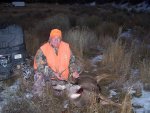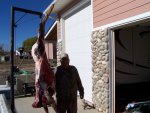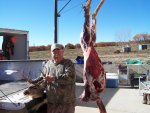Table fare mule deer
- Thread starter Yell Co AR Hunter
- Start date
This is why I started processing my own animals about 15 years ago. Intentionally shot a 1 1/2 old doe on an antlerless tag, when I got the meat back the meat was different colors of reds, one steak in a package was great the next was like eating a pine tree. I get/understand why they do it, but I chose not to partake in that process. That being said, even though I think we do a fantastic job taking care of our meat, about half the mule deer bucks I've shot, don't have a very great taste. I have been able to make them into sausage, or smoked meats, and it takes out/covers up that taste though.
Colorado Cowboy
Super Moderator
I have been butchering my own meat for 40 or so years. Once I started doing it myself, I NEVER got a bad piece of venison. I take special care in cutting and trimming the meat. I did get a small buck once that was tougher than shoe leather.....even the tenderloin. Ended up grinding it all.
Antelope is another story. I learned the hard way about taking care of the meat and getting it properly cooled. Now I don't have much trouble with them.
I have shot quite a few buck deer when the rut was going on and really couldn't tell a lot of difference in the taste. Yes they smelled a little stronger, but once the hide was removed and the meat cooled, most of the smell was gone. 2 years ago I shot a nice 4x4 during the rut. Got him butchered and packaged a couple of days after I shot him. I let the whole skinned deer hang in my garage. I took the loin steaks (cut about 1 1/2" thick) and soaked them overnight in buttermilk. Wrapped a strip of bacon around each one and froze them. I put them (thawed out) on a 500 degree bbq grill for about 3 mins on a side. Fed 10 of my friends and everyone raved how great they were, tasted like a beef filet they said.
Need some more!



Antelope is another story. I learned the hard way about taking care of the meat and getting it properly cooled. Now I don't have much trouble with them.
I have shot quite a few buck deer when the rut was going on and really couldn't tell a lot of difference in the taste. Yes they smelled a little stronger, but once the hide was removed and the meat cooled, most of the smell was gone. 2 years ago I shot a nice 4x4 during the rut. Got him butchered and packaged a couple of days after I shot him. I let the whole skinned deer hang in my garage. I took the loin steaks (cut about 1 1/2" thick) and soaked them overnight in buttermilk. Wrapped a strip of bacon around each one and froze them. I put them (thawed out) on a 500 degree bbq grill for about 3 mins on a side. Fed 10 of my friends and everyone raved how great they were, tasted like a beef filet they said.
Need some more!



Last edited:
mallardsx2
Veteran member
- Jul 8, 2015
- 3,984
- 3,329
Antelope is another story. I learned the hard way about taking care of the meat and getting it properly cooled. Now I don't have much trouble with them.
CC,
Could you elaborate on this? I am potentially doing an antelope hunt next season and would like to know more about proper meat care for this species.
Thanks
Colorado Cowboy
Super Moderator
Most antelope are killed in September when it can really be hot, this does not help in getting it cooled down asap. I always gut the animal immediately. Then depending on how far it is to transportation, I will either skin & quarter it in the field. Then put it in cloth meat bags and get it to camp. I usually put the meat in large plastic garbage bags and then into big coolers covered with ice water for at least over night. If I am close to camp, everything is done there. Once the meat has cooled, I trim all bloody or shot up pieces. Clean off any hair or dirt. I usually have a freezer and generator in camp so I can so some butchering, packaging and freezer before I go home.Antelope is another story. I learned the hard way about taking care of the meat and getting it properly cooled. Now I don't have much trouble with them.
CC,
Could you elaborate on this? I am potentially doing an antelope hunt next season and would like to know more about proper meat care for this species.
Thanks
That's it. Get the meat cooled down, cleaned up and ready for processing asap.
Mallards & CC,
For some reason, antelope meat just gets bad easily. It's easily my favorite meat when cared for as CC described, although I'd be nervous about putting any meat a plastic bag. Also, don't shoot an antelope that has been running a lot. Stressed animals have more lactic acid in their muscles, reducing the quality of the meat.
For some reason, antelope meat just gets bad easily. It's easily my favorite meat when cared for as CC described, although I'd be nervous about putting any meat a plastic bag. Also, don't shoot an antelope that has been running a lot. Stressed animals have more lactic acid in their muscles, reducing the quality of the meat.
Unscented plastic bags work well to ice meat in a cooler. Done it with antelope, deer, elk. We have mid-August antelope seasons in OR, 90 - 100 heat not unusual. Just make sure they have ice between them, once fully cooled off, you can pack em tight with ice on top without worries. Warm meat in a plastic bag absent ice, problem. When the bags go in the cooler, if the meat is not fully cold, it is a loose pack, plenty of ice, cooler tipped to drain.Mallards & CC,
For some reason, antelope meat just gets bad easily. It's easily my favorite meat when cared for as CC described, although I'd be nervous about putting any meat a plastic bag. Also, don't shoot an antelope that has been running a lot. Stressed animals have more lactic acid in their muscles, reducing the quality of the meat.
Some rutty mule deer are just about impossible to eat. Some soaks and marinades help, but I've had few quickly killed and properly cared for that did not eat well, ones I processed. Most rutty MD eat OK, not great. I've hunted MT/SD mid-Nov for over 25 years, wrapped my lips around lots of them taken by me and those in my party, some are just bad. Now we try for WT, no issues with rut taste so far, or skinny necked MD for the table. A soy, garlic, brown sugar marinade with plenty of ginger with some msg helps.
gonhunting247
Veteran member
- Jan 21, 2014
- 1,230
- 811
I've never had a bad tasting deer. Some have been better than others, but all were pretty darn good!
mallardsx2
Veteran member
- Jul 8, 2015
- 3,984
- 3,329
Thanks for the explanation and advice. I will keep this in mind on my trip.
-Ice Water
-Plastic bags (Unscented)
-Ice Water
-Plastic bags (Unscented)
Only inedible meat I’ve had was a Idaho elk. He was running from other hunters way up on the mountain and came down to where we were. He was hung and aged, we expected a great meal and on the first bite I was concerned about the taste. Took another bite and that was it. Could not eat it. The elk wasn’t mine so I didn’t have a bunch of it as it was split 4 ways.
Mule3006Elk
Active Member
- Jul 3, 2013
- 264
- 82
I have no where near the experience as some on this forum.
I have been fortunate to harvest several mule, none were taken to a butcher shop, all taste good and have a very similar flavor. They were all shot in weather 55 degrees or less, all were quartered in the field (bone-in), and on ice within a few hours. When I'm driving home I stop every hour and rotate the meat. I'm very meticulous when processing and remove as much fat and sinew as possible. I think that helps.
With antelope, as others have said, FAST field care and get on ice ASAP. The one I harvested this year was resting for 45+ minutes which allowed me to get within 200 yards. I harvested him when he got up to feed. No lactic acid on this guy. Taste fantastic straight up without soaking in milk or marinades etc.
I have been fortunate to harvest several mule, none were taken to a butcher shop, all taste good and have a very similar flavor. They were all shot in weather 55 degrees or less, all were quartered in the field (bone-in), and on ice within a few hours. When I'm driving home I stop every hour and rotate the meat. I'm very meticulous when processing and remove as much fat and sinew as possible. I think that helps.
With antelope, as others have said, FAST field care and get on ice ASAP. The one I harvested this year was resting for 45+ minutes which allowed me to get within 200 yards. I harvested him when he got up to feed. No lactic acid on this guy. Taste fantastic straight up without soaking in milk or marinades etc.

